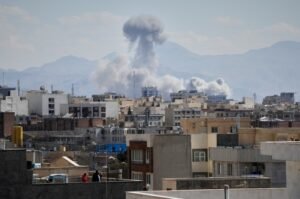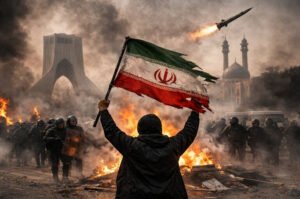🕒 Last updated: June 23 at 2:19 PM ET
In a stunning overnight escalation, the United States has launched airstrikes on multiple Iranian nuclear sites, formally entering the conflict between Iran and Israel.
The strike—authorized by President Trump—targeted Iran’s most heavily fortified facilities, including Fordow, Natanz, and Isfahan, marking the most direct U.S. military intervention in the region in over a decade.
According to U.S. defense officials, B‑2 stealth bombers and submarine-launched cruise missiles were used in a mission dubbed Operation Midnight Hammer. Massive Ordnance Penetrators—also known as “bunker busters”—were deployed to breach Iran’s underground enrichment facilities. Early assessments claim the sites were “completely and totally obliterated,” in the president’s words.
While the administration insists the operation was a “limited strategic strike” designed to dismantle nuclear capabilities, Iran has called it a “savage and unprovoked assault,” vowing that the U.S. will face “everlasting consequences.” Retaliatory strikes by Iran on Israeli territory have already been reported.
A Regional War Just Went Global
For weeks, the Israel–Iran war has raged across borders and battlefronts. But today, the U.S. made its involvement unmistakable.
Israeli Prime Minister Benjamin Netanyahu welcomed the U.S. action, calling it a “historic turning point.” Meanwhile, world leaders from London to New Delhi are calling for de-escalation. Emergency meetings at the United Nations and IAEA are underway, and several nations—Russia, China, Turkey, and Saudi Arabia among them—have sharply condemned the attack.
Security alerts have been raised across U.S. embassies worldwide, and cities like New York and Washington, D.C., have quietly ramped up protective measures at synagogues, mosques, and key infrastructure sites.
What Comes Next
It’s not yet clear whether the U.S. intends to conduct additional strikes or if this is a one-time show of force. But one thing is certain: this is no longer Israel’s war alone.
As Congress demands briefings and global markets brace for shockwaves, the American public is now facing a new chapter—one that may reshape the nation’s foreign policy, energy costs, and electoral conversation in a matter of days.
Live Updates
🕒 6/23 12:38 PM ET — U.S. officials confirm no casualties at Al Udeid Air Base in Qatar following Iran’s missile strike. Defense analysts say damage was “minimal,” though satellite imagery suggests one support structure may have been hit.
🕒 6/23 11:52 AM ET — Qatar’s Ministry of Foreign Affairs condemns the Iranian strike as a “violation of its sovereignty.” No retaliatory military action is planned, but all public events in Doha have been suspended for 48 hours.
🕒 6/23 11:25 AM ET — Airspace closures now affect five Gulf countries: Qatar, Bahrain, Kuwait, UAE, and Oman have restricted commercial flights amid security alerts. International carriers rerouting around the Persian Gulf.
🕒 6/23 10:47 AM ET — Iran’s state-run IRIB broadcasts footage of missile launches said to be targeting U.S. forces in the Gulf. The announcer calls it “Phase Two of the Resistance Storm.”
🕒 6/23 10:15 AM ET — Israeli airstrikes resume in southern Lebanon. Early reports indicate the strikes hit warehouses used by Hezbollah, with secondary explosions visible from the northern border.
The Author

Ellis Grant
Staff Writer, Readovia
























































